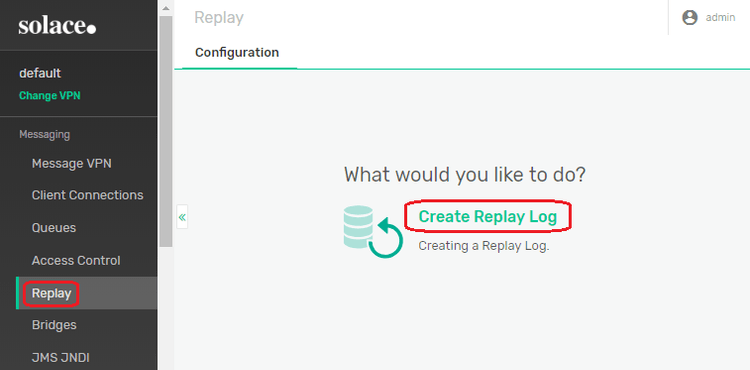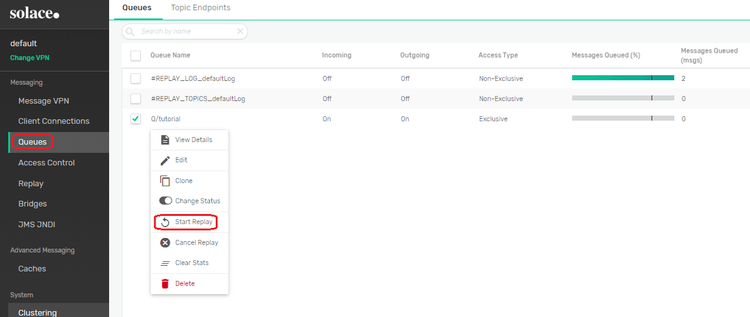Message Replay
6 Minute Read
In this introduction we show you how a client can initiate and process the replay of previously published messages, as well as deal with an externally initiated replay.
Feature Overview
During normal publishing, guaranteed messages will be removed from the message broker's queue or topic endpoint once the consumer acknowledges their receipt or successful processing. When Message Replay is initiated for an endpoint, the message broker will re-publish a requested subset of previously published and logged messages, which enables the client to process these messages again.
Message Replay can be used if a client needs to catch up with missed messages as well as for several other use cases.
Message Replay for an endpoint can be initiated programmatically from an API client connected to an exclusive endpoint, or administratively from the message broker. After the replay is done, the connected client will keep getting live messages delivered.
It's important to note that when initiating replay, the message broker will disconnect all connected client flows, active or not. A new flow needs to be started for a client wishing to receive replayed and subsequent messages. The only exception is that in the client initiated case the flow initiating the replay will not be disconnected.
Prerequisite
A replay log must be created on the message broker for the Message VPN using Message Replay CLI configuration or using Broker Manager administration console. Another option for configuration is to use the SEMP API.
NOTE: Message Replay is supported on Solace PubSub+ 3530 and 3560 appliances running release 9.1 and greater, and on the Solace PubSub+ software message broker running release 9.1 and greater. Solace Java API version 10.5 or later is required.
Code
Checking for Message Replay capability
Message Replay must be supported on the message broker, so this should be the first thing the code checks:
void checkCapability(final CapabilityType cap) {
System.out.printf("Checking for capability %s...", cap);
if (session.isCapable(cap)) {
System.out.println("OK");
} else {
System.out.println("FAILED - exiting.");
finish(1);
}
}
checkCapability(CapabilityType.MESSAGE_REPLAY);Initiating replay
First, a ReplayStartLocation object needs to be created to specify the desired subset of messages in the replay log.
There are two options:
- use
createReplayStartLocationBeginning()to replay all logged messages - use
createReplayStartLocationDate(Date date)to replay all logged messages received starting from a specifieddate. Note that the time zone matters - in this sample we will use UTC time zone for the date.
Note: The date can't be earlier than the date the replay log was created, otherwise replay will fail.
ReplayStartLocation replayStart = null;
// Example dateStr parameter: String dateStr = "2019-04-05T13:37:00";
if (dateStr != null) {
SimpleDateFormat simpleDateFormat = new SimpleDateFormat("yyyy-MM-dd'T'HH:mm:ss");
simpleDateFormat.setTimeZone(TimeZone.getTimeZone("UTC")); // Convert the given date into UTC time zone
Date date = simpleDateFormat.parse(dateStr);
replayStart = JCSMPFactory.onlyInstance().createReplayStartLocationDate(date);
} else {
replayStart = JCSMPFactory.onlyInstance().createReplayStartLocationBeginning();
}Indicate that replay is requested by setting a non-null ReplayStartLocation in ConsumerFlowProperties, which is then passed to JCSMPSession.createFlow as a parameter.
The target Endpoint for replay is also set in ConsumerFlowProperties below, which is the normal way of setting an endpoint for a consumer flow.
ConsumerFlowProperties consumerFlowProps = new ConsumerFlowProperties();
:
Queue queue = JCSMPFactory.onlyInstance().createQueue(queueName); // targeting this endpoint for replay
consumerFlowProps.setEndpoint(queue);
:
consumerFlowProps.setReplayStartLocation(replayStart);
/*
* Create and start a consumer flow
*/
consumer = session.createFlow(this, consumerFlowProps, null, consumerEventHandler);
consumer.start();
System.out.println("Flow (" + consumer + ") created");Replay-related events
FLOW_DOWN is the replay-related event that has several Subcodes defined corresponding to various conditions, which can be processed in an event handler implementing the FlowEventHandler interface.
Note that in the Java API, the event handler is called on the main reactor thread, and manipulating the session from here isn't allowed because it can lead to deadlock. There will also be a related exception raised where the session can be manipulated in the exception handler, see the description in the next section.
Some of the important Subcodes:
- REPLAY_STARTED - a replay has been administratively started from the message broker; the consumer flow is being disconnected.
- REPLAY_START_TIME_NOT_AVAILABLE - the requested replay start date is before when the replay log was created, which is not allowed - see above section, "Initiating replay"
- REPLAY_FAILED - indicates that an unexpected error has happened during replay
For the definition of additional replay-related Subcodes refer to the JCSMPErrorResponseSubcodeEx class in the Java API Reference.
Here we will define the ReplayFlowEventHandler to process events with some more example Subcodes. The event handler will set replayErrorResponseSubcode, which will be used in the exception handler.
private volatile int replayErrorResponseSubcode = JCSMPErrorResponseSubcodeEx.UNKNOWN;
class ReplayFlowEventHandler implements FlowEventHandler {
@Override
public void handleEvent(Object source, FlowEventArgs event) {
System.out.println("Consumer received flow event: " + event);
if (event.getEvent() == FlowEvent.FLOW_DOWN) {
if (event.getException() instanceof JCSMPErrorResponseException) {
JCSMPErrorResponseException ex = (JCSMPErrorResponseException) event.getException();
// Store the subcode for the exception handler
replayErrorResponseSubcode = ex.getSubcodeEx();
// Placeholder for additional event handling
// Do not manipulate the session from here
// onException() is the correct place for that
switch (replayErrorResponseSubcode) {
case JCSMPErrorResponseSubcodeEx.REPLAY_STARTED:
case JCSMPErrorResponseSubcodeEx.REPLAY_FAILED:
case JCSMPErrorResponseSubcodeEx.REPLAY_CANCELLED:
case JCSMPErrorResponseSubcodeEx.REPLAY_LOG_MODIFIED:
case JCSMPErrorResponseSubcodeEx.REPLAY_START_TIME_NOT_AVAILABLE:
case JCSMPErrorResponseSubcodeEx.REPLAY_MESSAGE_UNAVAILABLE:
case JCSMPErrorResponseSubcodeEx.REPLAYED_MESSAGE_REJECTED:
break;
default:
break;
}
}
}
}
}
:
private ReplayFlowEventHandler consumerEventHandler = null;
:
consumerEventHandler = new ReplayFlowEventHandler();
:
/*
* Create and start a consumer flow
*/
consumer = session.createFlow(this, consumerFlowProps, null, consumerEventHandler);Replay-related Exceptions
If a replay-related event occurs, the flow is disconnected with JCSMPFlowTransportUnsolicitedUnbindException, and the exception handler is called if the onException method is overridden in the XMLMessageListener object that was passed to createFlow().
In this sample the MessageReplay class implements XMLMessageListener, hence this is passed as the first parameter to createFlow().
Here is the overridden onException method. In this example JCSMPFlowTransportUnsolicitedUnbindException is handled depending on the replayErrorResponseSubcode, which was set by the event handler (see previous section).
- REPLAY_STARTED is handled by creating a new flow.
- REPLAY_START_TIME_NOT_AVAILABLE is handled by adjusting
ReplayStartLocationto replay all logged messages.
@Override
public void onException(JCSMPException exception) {
if (exception instanceof JCSMPFlowTransportUnsolicitedUnbindException) {
try {
if (exception instanceof JCSMPFlowTransportUnsolicitedUnbindException) {
switch (replayErrorResponseSubcode) {
case JCSMPErrorResponseSubcodeEx.REPLAY_STARTED:
System.out.println("Sample handling of an unsolicited unbind for replay initiated by recreating the flow");
if (consumerFlowProps.getReplayStartLocation() != null) {
consumerFlowProps.setReplayStartLocation(null);
}
consumer = session.createFlow(this, consumerFlowProps, null, consumerEventHandler);
consumer.start();
break;
case JCSMPErrorResponseSubcodeEx.REPLAY_START_TIME_NOT_AVAILABLE:
System.out.println("Start date was before the log creation date, initiating replay for all messages instead");
consumerFlowProps.setReplayStartLocation(JCSMPFactory.onlyInstance().createReplayStartLocationBeginning());
consumer = session.createFlow(this, consumerFlowProps, null, consumerEventHandler);
consumer.start();
break;
default:
break;
}
replayErrorResponseSubcode = JCSMPErrorResponseSubcodeEx.UNKNOWN; // reset after handling
}
}
catch (JCSMPException e) {
e.printStackTrace();
}
} else {
exception.printStackTrace();
}
}Running the Sample
Follow the instructions to build the samples.
Before running this sample, be sure that Message Replay is enabled in the Message VPN. Also, messages must have been published to the replay log for the queue that is used. The "QueueProducer" sample can be used to create and publish messages to the queue. The "QueueConsumer" sample can be used to drain the queue so that replay is performed on an empty queue and observed by this sample. Both samples are from the Persistence with Queues tutorial.
$ ./build/staged/bin/queueProducer <host:port> <client-username>@<message-vpn> [<client-password>]
$ ./build/staged/bin/queueConsumer <host:port> <client-username>@<message-vpn> [<client-password>]At this point the replay log has one message.
You can now run this sample and observe the following, particularly the "messageId"s listed:
- First, a client initiated replay is started when the flow connects. All messages are requested and replayed from the replay log.
$ ./build/staged/bin/featureMessageReplay -h <host:port> -u <client-username>@<message-vpn> \
-q Q/tutorial [-w <client-passWord>]- After replay the application is able to receive live messages. Try it by publishing a new message using the "QueueProducer" sample from another terminal. Note that this message will also be added to the replay log.
$ ./build/staged/bin/queueProducer <host:port> <client-username>@<message-vpn> [client-password]- Now start a replay from the message broker. The flow event handler monitors for a replay start event. When the message broker initiates a replay, the flow will see a DOWN_ERROR event with cause 'Replay Started'. This means an administrator has initiated a replay, and the application must destroy and re-create the flow to receive the replayed messages.
This will replay all logged messages including the live one published in step 2.
Learn More
- Related Source Code: MessageReplay.java
- Solace Feature Documentation

